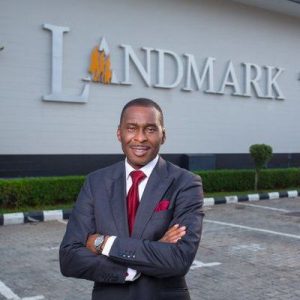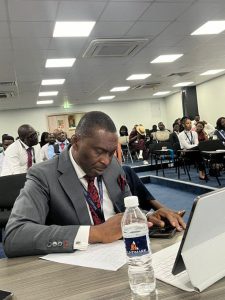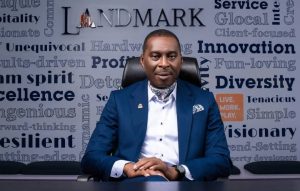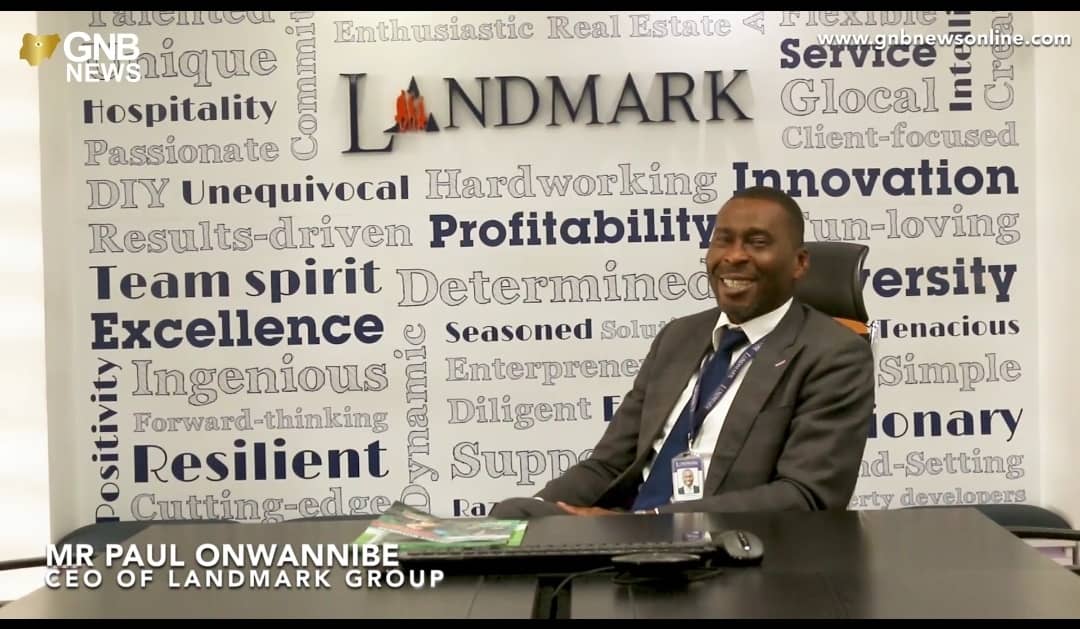It is our duty, as Nigeria’s business magazine of repute, to identify business rockstars of Nigerian make and shout their fames to the world. In this section, we went the entire stretch of the real estate ecosystem, unearthing some of the rarest industry gems you will ever come across, with Paul Onwanibe, an African business magnate.
Best known as the MD/CEO of Landmark Group – an African-focused real estate and serviced office company with over 500 companies as clients, with offices in five continents of the world.
Let’s begin!
TELL US IN EVERY SENSE OF IT ABOUT YOU AND YOUR LIFE JOURNEY SO FAR?
MR PAUL:
My name is Paul Onwanibe, I started my life many years ago in the mid-60s. I was born and grew up in London, and my parents were there as civil servants. I came back to Nigeria at the age of 10, went to secondary school at the age of 10, was tough in the first few years, went back to the UK for my 0’levels, came back to Nigeria again for my university in the university of Nigeria, I read architecture and after graduation I moved back to the UK to read construction management in MBA and that was it from the education point of view.
I worked as an architect for a few years to get my real estate British architect qualifications and I worked with a construction project management company then in that time I met a guy called Mark Dickson who was the founder of bridges and I went to work with him as one of the pioneer staffs who built bridges from effectively small business into a multibillion dollar business and sometime in the late 90s, 1997 or so, I decided to start Landmark I wanted to meet the segment of the markets that bridges didn’t meet. I started landmark, opened it up in a number of European cities, In London, Frankfurt, Madrid, Paris, Brussels, and two others, before opening up in New York. In the early 2000s I think 2003, a good friend of mine came to London and we met, he said ‘this thing you’re doing here, you can do it in Nigeria’ and at the time I didn’t have much experience in Nigeria.
I came to Nigeria in 2003/2004 and, being a different country that I’ve been coming on holidays and at that time, Nigeria was growing. The Africa region was been addressed globally more, structures were being put in place, the government seems to want to do things with the private sector, a bigger enabling environment was being driven, and there was a commodity chase so every foreign country was interested in Africa.
The banking and telecoms sectors were developing, so I thought this is something we could do. Therefore, we came in the next year but didn’t necessarily want a Nigerian business. We wanted to work in Africa generally so we setup offices simultaneously and took Lagos for the West of Africa, Nairobi for the East of Africa, Johannesburg for the South and Cairo for the North. Over the next 10years, we opened up 17 offices in 14 different cities in Africa to run what we call ‘service office business’. At that time, we realized it was tough, Africa was very different. There are three stages in this process, one is the property sourcing, second is the property itself and the third is the management of those properties.
We realized that, in Africa, because those segments were not as developed as I was used to, we noticed that you needed some control of property to provide the service with the property. As such, at that point, we decided to buy our own property.
That was what formerly gave birth to what you see here as our Landmark destination. As time went by, I realized that some boundaries were changing. Africa has its own unique problems of security, traffic, infrastructure and so on. Thus, I felt if you could put everything in one place, you could solve the problem a lot better and at the same time you can begin to crossover the boundaries of business and leisure. This has led us to where we are today. We created what we like to believe is the making of the destination. The aim was to create the number one “live, work and play” destination in Africa; at-least this side of Africa, which is a journey in progress.
SEEING THAT YOU WERE BORN IN LONDON, WOULD IT BE RIGHT TO SAY YOU WERE BORN WITH A SILVER SPOON?
MR PAUL: No. Definitely not. I said I was born from a civil service parents, my parents didn’t necessarily have money but they had education and they made it a duty to make sure that we were educated. We grew up like every normal child.
HOW DID YOU RAISE FUNDING FOR YOUR BUSINESS?
MR PAUL: That’s a long story. The first fund that I got was a combination of three things: friends, family and finance institution (bank called HSBC). I had a good relationship with one of the general managers and he liked the idea of our business and they put in the first half million pounds into our business. Then, my former boss, Mark Dickson also played his part.
YOU MENTIONED THAT YOUR GOAL IS TO CREATE THE FIRST PAN AFRICAN REAL ESTATE AND SERVICE ORGANIZATION THEMED ON THE LIVE, WORK AND PLAY PHILOSOPHY. HOW WELL IS THIS PLAN COMING ALONG?
MR PAUL: Its work in progress. You know this is a journey. Excellence is a journey. The idea basically is to create a business, leisure and lifestyle environment. The first thing to do is to figure out the most suitable environment and we’ve done that. Next is make the environment work (buy it and put the infrastructure in place). What should normally follow is to create it. Just to make sure you have enough things that create a destination. I’m proud to say, at Landmark today, we cut across 7 industries. Ranging from Retail to Food & Beverage industry, Education industry (Nigerian industry of technology and management), Sports industry (basketball, mini golf, football and all sort of beach sports), Health community (we have three different health centers and pharmacies) and, obviously, the Business industry.
We have many multinational, regional and local companies that operate within the landmark ecosystem. Our number one philosophy is to drive people in. Traditional real estate is all about bricks & mortar, build buildings, rent out the property and try to make money. Our philosophy is slightly different and that’s what we mean by “Live, work and play”. The philosophy here is to make sure We get as many people as possible to come into this environment, make sure they have enough things to do and enjoy themselves while servicing them well to make sure they have a nice time, feel good about themselves and go away tell other people about us- and then come back. How much money they spend when they are here will determine whether we are profitable or not. If they stay here long enough and they have enough things to do and they like it as much then I think we will do extremely well.
So, we are in that last segment and just trying to make sure, we can create the experiences and the service in a way that everybody enjoys it.
YOUR INTEREST IN REAL ESTATE RUNS REALLY DEEP (the passion is literally palpable in the air),

HOW WILL YOU RATE THE REAL ESTATE INDUSTRY IN NIGERIA VS OTHER PARTS OF AFRICA?
MR PAUL: It’s a tough one. Nigeria has its pluses and its minuses. I suppose the biggest thing about Nigeria, let me start with pluses, is the opportunity. when there’s nothing, then you have a blank template and you have lots of opportunities. So, if you look at cities like Brasilia, when it was created in brazil, it was an empty land so you start afresh. I think that’s what Eko Atlantic is doing, so it’s just easier to create something from nothing because you have a blank template. The advantage Nigeria has is close to a blank template, just that not all Nigerians understand that. We have so much land, space, opportunities, we have so many things to do here to improve on so there’s lots of opportunities and real estate itself is first class opportunity.
The difficulty with real estate in Nigeria is there’s a lot of the bodies and the regulatory environment and even people like us don’t understand the power of real estate and what we can do in the society. First of all, it’s a high employer of people, a major source of wealth. It takes time to build, and helps generate a society. To make it easy to produce real estate, if I were a president, it will be my number one thing but I’ll say it now because am a realtor right? But, seriously., it will do the following: develop a city, employ people, galvanize the economy and, ultimately, act as a catalyst to many other things.
Children go to schools to learn, people go to the hospital to get cured, and businesses work in the Offices. Real estate is the platform for almost everything, so if you create enough good real estate, then you’d create a great platform for many things. We’re on our way. There’s some tweaking to do, but the opportunity is huge (also the challenges). I don’t need to repeat the challenges everybody have them. We still need to develop our infrastructure a little bit better, we need to create a better and enabling environment to allow it to flourish.
You were formally trained in Architecture, Property Development and Construction Management, together at a London Business School MBA merit in “Value Engineering”. How crucial is this training to what you do now? Can Nigerian-trained professionals also aspire to reach your level of success?
MR PAUL: Success is a journey, I don’t think it’s a destination. I won’t describe myself as successful, but I’d say that, as long as you keep success in your focus as your end game, then you’d do things that’d make you successful. In terms of my educational background, education is one thing, practice is another. I think from an education point of view, it has helped me to understand different things. Thus, my architecture training just help me to create things, I know how buildings work, I can understand the relationship between buildings and people and that’s really what real estate is. That’s equally what architecture is. It’s how you design buildings to fit the needs of how people want to use them. Not about beautiful things, they would come out beautiful anyway if they re used well.
In essence, my architecture training enabled me to do that. My construction management training also enabled me to understand construction, how to actually get the building from paper into bricks and mortar. My MBA enabled me understand how to use a building for business. So, the common strategy is people and, if you understand people, you’d understand everything. My trainings helped me get so far down the way, experience is everything. Thus, as you go through different challenges in different environments with different sectors and different people, you gain valuable experience that’d help you to solve problems.
You don’t get everything right, but we’re still striving to get many things right.
How Has Your Brand Fared In The Area Of Creation Of Job Opportunities In Several African Cities For The Youth?
MR PAUL: Currently, we have 3,000 people employed within this ecosystem and that, in itself, is a big number. More importantly, we have 150,000sqm of real estate developed and, for every square meter (sam) of real estate, you employ 3 people. Therefore, if you look at 150,000sqm of real estate, that’s 450,000 people that means half a million people have been employed either directly or indirectly on our journey so far.
Yes, the country has 200 million people, today, so it’s about half a percent of the country but it tells you that if there were a hundred of organizations that were enabled like ours, it would employ 50% of the country. By the very nature of what we do, a lot of young people are involved and young people have things that are specific, sometimes I wish I was young again. In the youths, you have energy, creativity, you’re bolder and braver, you do things and you don’t have to think as much about.
Nigeria has a very young population. Africa has an extremely young population, so, I’d say 90% of the people you employ will end up being the youths. Many learn, many are eager to understand and learn, a few take their time but that’s the way of life. I’d like to believe that we’ve made a significant impact in terms of just employment and training, understanding creativity as well, especially in the area where the youth sits.
You sit on the board of several institutions in Europe, America and Africa including MIN’s subsidiary Fintech Yellow Digital, Cancer Care Federation for West Africa, Lakeshore Medical Centre, Brookstone Properties, Kimberly Ryan, Carbon Micro Finance Bank & Stanmore Real Estate and has significant charitable interests in Health and Education. You also mentor a young leadership group operating in 3 continents. How are you able to juggle all these role, do you have more than 24 hours in a day (chuckles)?
MR PAUL: First thing I’d say is you’ve done a lot of research on me. You know almost as much as I know about me. As much as I know about myself, Kudos to you on that. Do I have more than 24hrs in a day? No. I have great people around me and if you have great people around you, then it stretches the number of hours you have in a day.
Sitting on the board of an organization is about lending your experience and knowledge, not actually doing the work.
Working in an organization is actually creating and executing. I only work in one organization, which is Landmark, but I sit on the board of the others, so all I do is try to lend my knowledge and experience, it doesn’t take that much time. But this is where the time is spent and how you get everybody to come together around the same dream. And, having the same amount of desire to execute that dream, is what makes it different.
In what other ways are you adding value to Nigeria, the West African region, and Africa at large?
MR PAUL: I’d just mention three things. I’d say first, we’ve talked about employment, ensuring that these generation of people know how to do things the right way and patient enough to do it properly; while pursue excellence in a way that very few people can. I think we’ve made our own little thinking universe there. The second is Creativity, what happens in the world, many people do things that has been done before and few people decide to do things that haven’t been done before.
I think we’re probably one of those organizations that have decided we would make our mistakes, get somethings wrong, but we want to do things that haven’t been done before. Thus, that creativity means you are trend setters.
One quick example, from our conventional center, to the best of my knowledge we were the first major non-governmental event center here and now 10 years on, i look around, every street has one. We were the first in-city private beach, llashe beach that was created and I see that a lot more other leisure beaches are coming up. So, I’d like to believe that we started a trend but the real difficulty is how do you stay at the top and how do you ensure that what you’ve created and what has gone beyond you doesn’t compete and take away from you, but aligns with you and you stay right on the helm of things.
The third is Pressure, it’s just that desire to make the environment you’re in better. Thus, we stretch outside our environment and think of things that are literally bigger than us and obviously businesses are made to make money, but businesses are made also to change people’s lives. I will like to believe that a lot of people who have passed through this business have had their lives changed. They’ve gone on to do bigger and better things and a lot of the communities outside our business have benefited from us having a business like this. We pay our taxes so we’d like to believe the government has benefitted in many ways, too.

What are the biggest challenges Landmark is facing right now? And gossip to us a bit, what you are currently working on now
MR PAUL: Laughs, let me start with the gossip. We’re working on 2 things, one is real gossip because it hasn’t been heard outside this room before. Let me start with the non-gossip. We are building what we call Water View Development, it’s a thirty-floor tower. Largely residential and the idea is to bring a whole set of people to buy apartments that normally wouldn’t have the benefit of an apartment in an ecosystem like this-at the cost that we’re trying to sell these apartments at. We’re creating and designing this apartment specifically for people who would like to be part of this business-leisure- lifestyle community and, at the same time, look at the water, play on the beach and also use the services around.
That project is going to take about 3 years and will cost averagely 70million dollars. It’s really an interesting project and we look forward to it. The second is, we’re trying to do a giant ferry. One similar to the London high, Dubai high and these are the most major cities around the world. It’s a legacy project that changes the skyline of cities but, more importantly, it brings the tourists impact to the city that has never been seen before.
The London high was created because of the millennium crossing and, when it was done, every year they get 12.6million visitors just in terms of economics. The city of London has heavily benefitted from it, people travel from all over the world to go on it. Dubai launched theirs barely a year ago and, in that short time, they’ve had 17 million visitors.
And it only opened for half of the year because of the excruciating weather. We would like to believe that the impact it would have in Lagos as a city, Nigeria as a country and even in West Africa as a region will be huge and, if it’s successful, in those country, it would be successful for us. So that’s the little gossip and the secret.
Now the challenges, it’s impossible to go through life without challenges, whatever country or city you are or whatever circumstances you’re in, you’re going to have challenges. It’s how you deal with those challenges, In Nigeria we have some specific challenges but they’re all the same, people talk about power, bad government, enabling environment, roads, water, most of these are fairly easy to solve but they are someone else’s problem to solve in many ways and why there are challenges in a country like this is because you’d feel helpless in dealing with them you need other people to deal with them. Those challenges are common, there are some good amongst it, we talked about the opportunity, people, the best thing about Nigeria is the people, our people are resilient, strong, creative and a country like this that has this number of youthful people with that kind of potential can’t go wrong eventually, it’s how we ensure that they play a major role in taking the country forward.
WHAT IS THE ONE LESSON YOU’VE LEARNT OVER THE YEARS AS A BUSINESS MAN THAT CAN HELP ANOTHER BUSINESS OWNER?
MR PAUL: if I was to take a shot on this, I’ll say whatever you decide to do, just make sure it’s the right thing and you’re passionate about it. Make sure you understand it and you understand the market around it and make sure people need it. If you hit those three boxes, believe in it and stop at nothing to deliver it. In business, there are just so many challenges. I’ll pick some percentage out of the sky, 90% of people come across challenges and they do something else, they back off, they do it in half measures. It usually tells me that they didn’t believe in it enough, they didn’t trust it enough, or they didn’t research it enough. My big advice would be, before you start anything, make sure you have all the ingredients for success because when you go into it, you’d have challenges but at least you’re dealing with challenges you’re meeting, you’re not dealing with the challenges you should have seen coming in the first instance. Everything is tough and this is irrespective of where you do it and who you do it with. Research what you do, be equipped to do what you do and, then, believe in it enough and in yourself to push it through.

DO YOU HAVE A HOBBY O UTSIDE OF WORK THAT HELPS YOU TO BE A BETTER PERSON/LEADER?
MR PAUL: Laughs, Yes, three things are important to me. One of them is work, Landmark, and we’re running a business leisure lifestyle, so it’s usually work and play, it’s not all work. My family is another, I have 2 kids and a lovely wife, so that’s pleasure as well and that’s part of what I do outside work. The third thing is Arsenal, I’m a football fan. But I won’t say I’m a football fan, I’m an arsenal fan. So, I spend a lot of my time, effort, energy and money supporting a team that, sometimes, does well and sometimes does badly.
CLICK ON THIS LINK (https://youtu.be/Ax4A7g4xveI?si=ALGKaaviZyX9xzie) TO WATCH INTERVIEW ON YOUTUBE






